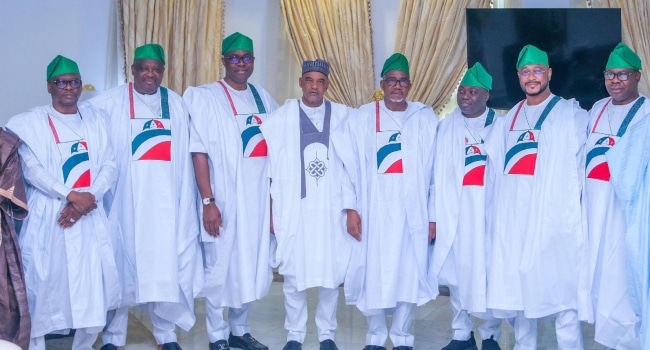ARTICLE AD
The Minister of Works, David Umahi has disclosed the reason President Bola Tinubu ordered the rerouting of Lagos-Calabar Coastal Highway.
He said the directive was given to avoid subsea telecommunications cables and essential services near the coastline.
The Minister said two people had written a petition to Tinubu and the President subsequently called him and warned against touching the cables from the ocean.
He disclosed this during a question and answer segment at a stakeholder engagement meeting held at Eko Hotel, Lagos, on Sunday.
A concerned resident raised issues regarding a specific stretch of the project known as “chainage 16 to 18.”
The resident explained that the coastal road diversion in this section had affected an estate that is home to Nigerians in diaspora and local cooperatives.
“Why I’m here is because of chainage 16 to 18. I have been talking about it. The issue in chainage 16 is that the coastal road was diverted into our estate, which belongs to several Nigerians in diaspora, several cooperatives in Nigeria,” the woman said.
Umahi acknowledged the concerns, explaining that the diversion was necessary to avoid critical infrastructure like subsea telecommunications cables and other essential installations.
He referenced specific areas, such as the MTN cable line and a nearby power station, where the highway would cross. For instance, at kilometer 19, near an MTN cable and close to a power station, the Ministry has opted to build a flyover to cross above the cable line rather than risk disruption by working directly on top of it.
“We’re going to do a flyover to go over the road there, because of their cable,” he said.
He noted that the initial plan was to keep the road along the coast, but that was adjusted following directives from President Bola Ahmed Tinubu.
“The issue is that we diverted the coastal road into a place that was not gazetted, so to say,” Umahi admitted.
The minister added, “It is cheaper and better for us to have gone within the coastline. It’s cheaper for us, it’s better for us. It is a coastal road. But the president directed, because these two people (stakeholders) went to send a petition, and he called me and said, ‘do not touch the cables from the ocean.’ We have also avoided the MTN cable line.”
Originally, the highway’s design prioritised a coastal route, which would have been more cost-effective.
However, following complaints from stakeholders, including companies with essential underground installations, President Tinubu mandated a diversion to safeguard these assets. The adjustments affected specific areas such as chainage 16 to 18, where the road intersects with an estate home to Nigerians in diaspora and local cooperatives.
Naija News reports that the Lagos-Calabar Coastal Highway is one of Nigeria’s largest infrastructure projects, designed to enhance connectivity and boost economic growth along the nation’s coastline.

 2 weeks ago
5
2 weeks ago
5 

